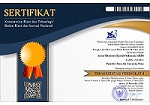Apakah Literasi Mempengaruhi Penerimaan Zakat?
Abstract
Zakat is not only relates to ilahiyah worship but also relates to muamalah which has social and economic value. Zakat can be used as a tool to increase welfare and eradicate poverty. Since, Indonesia has large Muslim population, it supposes to has large amount of Zakat. However, the actual recorded zakat collection is still very far from the potency. People zakat literacy about zakat obligations is also low. This paper aims to see the impact pf zakat literacy to zakat collection by OPZ. This research was an associative quantitative study using PLS-SEM bootstrap with WarpPLS5. The object of this research was 9 OPZs (8 LAZNAS and 1 BAZ) which have representative offices in Surabaya. Respondents of this study were muzakki who represented OPZ. The results of this study indicated that zakat literacy has a significant effect on the realization of zakat collection, however the intention to pay zakat does not mediate the relationship between literacy and the realization of zakat collection. This research can be used to identify steps to increase zakat collection.
Keywords
Full Text:
PDFReferences
Abu Bakar, N. B., & Rashid, H. M. A. (2010). Motivations of Paying Zakat on Income: Evidence from Malaysia. International Journal of Economics and Finance, 2(3), 76–84. https://doi.org/10.5539/ijef.v2n3p76
Ajzen, I. (1985). From intentions to actions: A theory of planned behavior. In Kuhl J & B. J (Eds.), Action control (Springer S, pp. 11–39). Springer. https://doi.org/https://doi.org/10.1007/978-3-642-69746-3_2
Ajzen, I. (1991). The theory of planned behavior. Organizational Behavior and Human Decision Processes, 50(2), 179–211. https://doi.org/https://doi.org/10.1016/0749-5978(91)90020-T
Albaity, M., & Rahman, M. (2019). The intention to use Islamic banking: an exploratory study to measure Islamic financial literacy. International Journal of Emerging Markets, 14(5), 988–1012. https://doi.org/10.1108/IJOEM-05-2018-0218
Antara, P. M., Musa, R., & Hassan, F. (2016). Bridging Islamic Financial Literacy and Halal Literacy: The Way Forward in Halal Ecosystem. Procedia Economics and Finance, 37(16), 196–202. https://doi.org/10.1016/s2212-5671(16)30113-7
Ascarya, & Yumanita, D. (2018). Analisis Rendahnya Pengumpulan Zakat Di Indonesia Dan Alternatif Solusinya. In Bank Sentral Indonesia (Vol. 9).
BAZNAS. (2019). Statistik Zakat Nasional 2019 (National Zakat Statistics 2019). In Baznas.
Bidin, Z., Idris, K. M., & Shamsudin, F. M. (2009). Predicting compliance intention on zakah on employment income in malaysia: An application of reasoned action theory. Jurnal Pengurusan, 28, 85–102. https://doi.org/10.17576/pengurusan-2009-28-05
Bidin, Z., Othman, M. Z., & Noor Azman, F. M. (2013). Zakat Compliance Intention Behavior on Saving among Universiti Utara Malaysia’s Staff. Proceeding of the International Conference on Social Science Research, Penang Malaysia, June 2013, 145–155.
Canggih, C., Fikriyah, K., & Yasin, A. (2017a). INKLUSI PEMBAYARAN ZAKAT DI INDONESIA. Jurnal Ekonomi Dan Bisnis Islam, 3(1), 1–11. https://doi.org/http://dx.doi.org/10.20473/jebis.v3i1.3164
Canggih, C., Fikriyah, K., & Yasin, A. (2017b). Potensi Dan Realisasi Dana Zakat Indonesia. Al-Uqud : Journal of Islamic Economics, 1(1), 14. https://doi.org/10.26740/jie.v1n1.p14-26
Dodik Siswantoro & Nurhayati, . (2012). Factors Affecting Concern about Zakat as a Tax Deduction in Indonesia. Int. J. Manag. Bus. Res, 2(4), 293–312.
Firdaus, M., Beik, I. S., Irawan, T., & Juanda, B. (2012). Economic estimation and determinations of Zakat potential in Indonesia. In IRTI Working Paper Series: Vol. WP 1433-07 (IRTI Working Paper Series, Issue August).
Hassan Al-Tamimi, H. A., & Anood Bin Kalli, A. (2009). Financial literacy and investment decisions of UAE investors. Journal of Risk Finance, 10(5), 500–516. https://doi.org/10.1108/15265940911001402
Heikal, M., Khaddafi, M., & Falahuddin. (2014). The Intention to Pay Zakat Commercial: An Application of Revised Theory of Planned Behavior. Journal of Economics and Behavioral Studies, 6(9), 727–734. https://doi.org/10.22610/jebs.v6i9.532
Herlin, Ghanny, A. R., Afandi, Y., & Zaenal, M. H. (2020). Zakat Literacy Index among Millenials (No. 12; PUSKAS WORKING PAPER SERIES).
Hiyanti, H., Fitrijanti, T., & Sukmadilaga, C. (2020). Pengaruh Literasi dan Religiusitas terhadap Intensi Berwakaf pada Cash Waqf Linked Sukuk (CWLS). Jurnal Ilmiah MEA (Manajemen, Ekonomi, Dan Akuntansi), 4(3), 493–507.
Khamis, M. R., Mohd, R., Md Salleh, A., & Nawi, A. S. (2014). Do Religious Practices Influence Compliance Behaviour of Business Zakat among SMEs? Journal of Emerging Economies and Islamic Research, 2(2), 25. https://doi.org/10.24191/jeeir.v2i2.9622
Lusardi, A., & Mitchelli, O. (2007). Financial literacy and retirement preparedness: Evidence and implications for financial education. Business Economics, 42(1), 35–44. https://doi.org/10.2145/20070104
Mahdzan, N. S., & Tabiani, S. (2013). The impact of financial literacy on individual saving: An exploratory study in the malaysian context. Transformations in Business and Economics, 12(1), 41–55.
Manurung, H., Y, R. B., Ricky, I., & Darmanto. (2018). Pengaruh Literasi Keuangan Terhadap Intensi Berinvestasi dengan Moderasi Self Regulatory Focus. Indonesian Business Review, 1(1), 1–10. https://doi.org/https://doi.org/10.21632/ibr.1.1.51-60
Mitchell, O. S., Lusardi, A., & Curto, V. (2011). Financial Literacy Among the Young: Evidence and Implications for Consumer Policy. SSRN Electronic Journal, 1–35. https://doi.org/10.2139/ssrn.1459141
Mohd. Safri, M. (2006). Zakat perniagaan: Cabaran pelaksanaan di Malaysia. In I. A. Ghafar & M. . Hailani (Eds.), Zakat: Pensyariatan,Perekonomian dan Perundangan. (pp. 174–197). University Kebangsaan Malaysia:
Mohd Asri, M. A., Mohd Danial Afiq, K. T., Adib Izzat, S., Faris Ridhwan, F. S., Nik Muhammad Farith Adruc, N. A., & Wan Muhammad Syafiq, W. Z. Z. (2017). Factors that Influence the Zakat Collection Funds : A Case in Kuantan. South East Asia Journal of Contemporary Business, Economics and Law, 13(1), 30–37.
Muhammad. (2002). Zakat profesi: wacana pemikiran dalam fiqih kontemporer. Salemba Diniyah. https://books.google.co.id/books?id=LjfYAAAAMAAJ
Mukhlis, A., & Beik, I. S. (2013). Analisis Faktor-faktor yang Memengaruhi Tingkat Kepatuhan Membayar Zakat: Studi Kasus Kabupaten Bogor. Al-Muzara’ah, 1(1), 83–106. https://doi.org/10.29244/jam.1.1.83-106
Mulyawisdawati, R. A., & Nugrahani, I. R. (2019). Peran Zakat Produktif dalam Pemberdayaan Ekonomi Mustahiq (Studi Kasus Lembaga Amil Zakat Dompet Dhuafa Republika Yogyakarta 2017). JESI (Jurnal Ekonomi Syariah Indonesia), 9(1), 30. https://doi.org/10.21927/jesi.2019.9(1).30-41
Owoyemi, M. Y. (2020). Zakat management: The crisis of confidence in zakat agencies and the legality of giving zakat directly to the poor. Journal of Islamic Accounting and Business Research, 11(2), 498–510. https://doi.org/10.1108/JIABR-07-2017-0097
Pulungan, D. R. (2017). Literasi Keuangan Dan Dampaknya Terhadap Perilaku Keuangan Masyarakat Kota Medan. EKONOMIKAWAN: Jurnal Ilmu Ekonomi Dan Studi Pembangunan, 17(1), 56–61. https://doi.org/10.30596/ekonomikawan.v17i1.1180
Saleh, H. E. H. (Ed.). (2008). Kajian fiqh nabawi & fiqh kontemporer. Rajawali Pers.
Sheeran, P., & Webb, T. L. (2016). The Intention–Behavior Gap. Social and Personality Psychology Compass, 10(9), 503–518. https://doi.org/10.1111/spc3.12265
Syahrullah, & Ulfah, M. (2016). Response of Indonesian Academicians Toward Factors Influencing the Payment of Zakat on Employment Income. Research on Humanities and Social Sciences ISSN, 6(10), 87–94.
Uzaifah, U. (2007). Studi Deskriptif Perilaku Dosen Perguruan Tinggi Islam DIY dalam Membayar Zakat. La_Riba, 1(1), 127–143. https://doi.org/10.20885/lariba.vol1.iss1.art9
Yusfiarto, R., Setiawan, A., & Nugraha, S. S. (2020). Literacy and Intention to Pay Zakat : A Theory Planned Behavior View Evidence from Indonesian Muzakki. International Journal of Zakat, 5(1), 15–27.
Zakat, P. K. S. N. B. A. (2019). Indeks Literasi Zakat : Teori dan Konsep. Pusat Kajian Strategis – Badan Amil Zakat Nasional (Puskas BAZNAS). https://www.puskasbaznas.com/publications/books/1020-indeks-literasi-zakat-teori-dan-konsep
DOI: http://dx.doi.org/10.21927/jesi.2021.11(1).1-11

This work is licensed under a Creative Commons Attribution-ShareAlike 4.0 International License.












